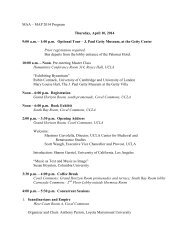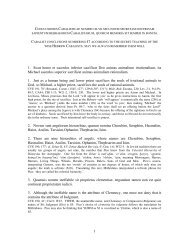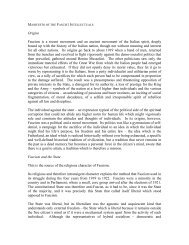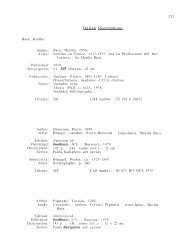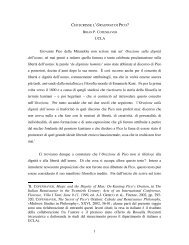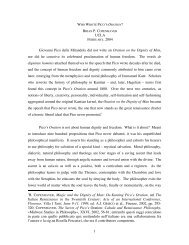1 (1) Pythagoras of Samos instructed the region of Italy once called ...
1 (1) Pythagoras of Samos instructed the region of Italy once called ...
1 (1) Pythagoras of Samos instructed the region of Italy once called ...
You also want an ePaper? Increase the reach of your titles
YUMPU automatically turns print PDFs into web optimized ePapers that Google loves.
substance, and this certainly belongs not to one species but to contrary species. Someone<br />
separating black sheep from white should not put <strong>the</strong> half-white among <strong>the</strong> black nor<br />
among <strong>the</strong> white ei<strong>the</strong>r but should set <strong>the</strong>m apart from both.<br />
For to say that man is a ‘body’ is not to talk about a man, and it is worse than saying<br />
‘man is a soul’ since soul is <strong>the</strong> better part <strong>of</strong> man. (9) This did not escape <strong>the</strong> notice <strong>of</strong><br />
<strong>the</strong>se people, but <strong>the</strong>y thought that soul is not a substance, and so <strong>the</strong>y said that both trees<br />
and plants have soul (a point to be discussed shortly), also making a foolish distinction<br />
between ‘animate body’ and ‘animal,’ as if <strong>the</strong>se were different. Now no animal at all<br />
need be <strong>called</strong> ‘immortal.’ Indeed, because <strong>the</strong> angels who are in heaven or in <strong>the</strong> place<br />
below are not ‘animate bodies,’ <strong>the</strong>y are also not ‘animals,’ not having been endowed<br />
with body.<br />
(10) Therefore, ‘bodiless substance’ or ‘spirit’ is divided into ‘creating’ and ‘created’;<br />
‘created’ into ‘angelic’ and ‘non-angelic’; ‘angelic’ (if you like) into ‘celestial’ and<br />
‘infernal,’ with ‘Michael,’ ‘Gabriel,’ ‘Satan’ and ‘Lucifer’ as individuals. And ‘nonangelic’<br />
is divided into one made in <strong>the</strong> image <strong>of</strong> God and <strong>called</strong> ‘human,’ with ‘my<br />
spirit’ and ‘yours’ as individuals; and one not made in <strong>the</strong> image <strong>of</strong> God, which perhaps<br />
can also be divided into species, whose individuals are ‘<strong>the</strong> spirit <strong>of</strong> this brute’ and ‘<strong>of</strong><br />
that one.’ (11) ‘Bodily substance’ or ‘body’ is divided into ‘plant’ and ‘non-plant’; and<br />
‘plant body’ itself can perhaps also be divided into its own species, whose individuals are<br />
‘this olive,’ ‘this laurel.’ ‘Non-plant body’ is divided into ‘gold’ and ‘non-gold’ and<br />
perhaps even far<strong>the</strong>r, with ‘this gold piece,’ ‘this silver ring’ as individuals.<br />
(12) ‘Animal’ belongs to nei<strong>the</strong>r genus, nei<strong>the</strong>r black sheep nor white, as I mentioned,<br />
nor does it belong to ‘spirit’ or ‘soul’ or ‘body’ even though it is composed <strong>of</strong> all three.<br />
Therefore we shall classify it by itself into ‘human’ and ‘non-human.’ I exclude ‘Christ’<br />
from ‘animal’ because he is not just man but God as well. As individuals belonging to<br />
‘human’ I have already mentioned ‘Socrates,’ ‘Plato.’ The ‘non-human’ or ‘beast’ can, if<br />
you prefer, be divided into many species, as I have shown. Therefore, since <strong>the</strong> first<br />
category is ‘substance’ and is divided into ‘spirit’ or ‘soul’ and ‘body,’ let us see what<br />
Aristotle thinks about <strong>the</strong>m both.<br />
8 ON SPIRIT AND ON GOD AND ANGELS<br />
(1) ‘Spirit,’ as I was saying, is on <strong>the</strong> one hand ‘creator,’ on <strong>the</strong> o<strong>the</strong>r hand ‘created.’<br />
Although I acknowledge that <strong>the</strong> Creator is a substance, none<strong>the</strong>less I would say not that<br />
he is composed <strong>of</strong> matter and form but that <strong>the</strong>re is one essence <strong>of</strong> God and three<br />
properties, and whe<strong>the</strong>r <strong>the</strong>se may be <strong>called</strong> ‘qualities’ I shall examine in <strong>the</strong> appropriate<br />
place. But I think that nothing can correctly be <strong>called</strong> ‘matter’ in such a thing. For who<br />
but an unbearably arrogant philosopher, without regard for usage and custom in speaking,<br />
would say ‘<strong>the</strong> sun’s matter’? Ordinary language treats ‘matter’ like wood in a box,<br />
stones in a house or <strong>the</strong> action in a lawsuit: for <strong>the</strong> sun and o<strong>the</strong>r things, <strong>the</strong>refore,<br />
‘essence’ is better, and thus also for God. Augustine does this, writing ‘one essence <strong>of</strong><br />
God, three persons,’ as <strong>the</strong> Greeks used both prosôpa and hupostaseis, ‘persons’ or<br />
34<br />
2/21/05 9:35 PM 34/44



